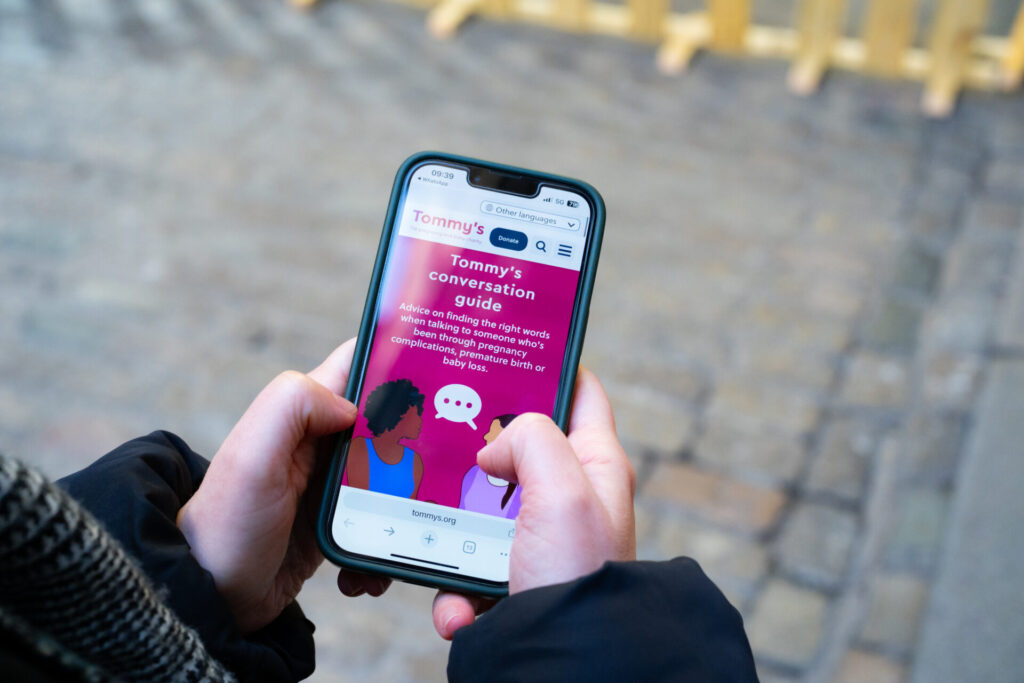Baby and pregnancy loss affects millions annually in the United Kingdom yet research shows that 53% of Brits avoid the subject. This makes sense right? People have a penchant for avoiding sensitive topics and there is almost nothing more sensitive than loss. Yet, Tommy’s, a UK charity funding pregnancy and baby loss research, urges us to acknowledge this loss by cultivating a more open dialogue.
Projecting Life is a campaign to raise awareness of the number of those who experience baby loss in the UK each year. 2023 research from YouGov shows that half of adults in the UK have experienced baby loss or know someone who has. Tommy’s shares resources online and raises funds for research and to provide specialist care to those in need.

As part of Projecting Life, Tommy’s has published a conversation guide, helping you navigate those tricky conversations and better understand how to support those who are grieving. Instead of shying away from offering support due to hesitation about what to say, read the guide and think about how you could apply these tips to your situation.
First, let’s look at the stats:
- 53% of respondents ‘would not know what to say’ or ‘would worry about saying the wrong thing’ to a friend, family member or colleague who had experienced a loss.
- 12% were ‘very confident’ they would know what to say to someone whose pregnancy ended in a loss, or who had a premature baby in need of hospital care.
When asked why they avoid speaking of baby loss, most respondents claimed they didn’t know what to say. This is understandable, right? It isn’t easy to navigate the best forms of communication when comforting someone in the face of loss. Trauma and grief are complex things and everyone deals with them differently. The one-shoe-fits-all approach is entirely wrong here.
No one wants to say the wrong thing to a loved one in the face of loss, our top priority is always to provide comfort and help in any feasible way. And yet the ways we can offer comfort and support to loved ones can vary and take different forms. The most important thing is to be there if they need you.

The guide is digestible, and broken into four sections:
Acknowledge, Listen, Support, Do.
Although there is no right thing to say in such a time as baby loss, if you follow these key stages, it may help you better articulate the support you wish to give. This format allows you to follow the guide yet use your own words, you know your loved ones and what they respond to, so follow your gut instinct and trust yourself. The key aspect of comforting loved ones is your support and presence. Just showing that you care and are there if they need you, is key. Don’t avoid the situation because you are worried you will say the wrong thing.
Tommy’s created the guide using the real experiences of parents who have experienced loss – collecting what helped them and what didn’t – and sharing this knowledge to help others in the future.

Dr Jyotsna Vohra, Director of Research, Programmes and Impact at Tommy’s, says:
“The trauma of pregnancy loss or giving birth prematurely is too often compounded by a sense of isolation and even shame.
“We must end the silence around these experiences, and move further and faster towards our goal of making pregnancy and birth safe for everyone.
“Projecting Life shows very powerfully that children who are lost are never forgotten. It encourages us all to recognise that and to talk about it without fear. Through those conversations and by raising awareness, together we can drive the change needed to save more babies’ lives.”
Projecting Life will help raise awareness of how many families in the UK are touched by the trauma of baby and pregnancy loss. Tommy’s goal is to continue funding research to change this devastating statistic.
If you have suffered pregnancy loss or know someone affected by this, there are free resources provided by the NHS and charities like Tommy’s which can provide emotional support and psychological care.












